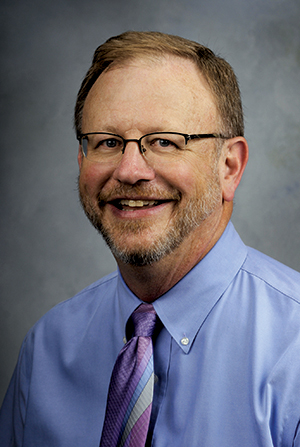Draper named associate dean for research, graduate programs for College of Agriculture
Former Plant Pathology department head assumes permanent post after interim role
Nov. 20, 2019
MANHATTAN, Kan. — Martin Draper has been appointed to the permanent post as associate dean for research and graduate programs for the College of Agriculture and director of research for K-State Research and Extension.
He has served in that role in an interim capacity since September 2018.
Draper interviewed and was chosen for the role following the appointment of Ernie Minton as interim dean of the College of Agriculture and interim director of K-State Research and Extension, the university’s statewide system for generating and sharing knowledge through offices in regional research centers, experiment fields and every county throughout Kansas. On July 1, Minton was appointed as permanent dean and director after a national search.
“Dr. Draper came to the role at a time when we had, and still have, multiple other interim leadership positions in the college. Marty’s appointment will bring needed stability, along with a unique set of leadership and management skills to the position,” Minton said. “Marty has taken the lead on a number of challenging issues for the college and K-State Research and Extension, and I am very grateful for the leadership continuity this appointment will bring us.”
According to Draper, “The College of Agriculture and K-State Research and Extension are a powerful research engine for the university. Much of our land-grant heritage is lived out every day through the activities we conduct in the Kansas Agricultural Experiment Station and the Cooperative Extension Service. Research and graduate education are inextricably linked.”
Draper will guide the Experiment Station research efforts. “Our future in Kansas is driven by research that brings new opportunities for Kansans,” he said. “If I can help researchers make a difference for the state, I will feel a sense of accomplishment. I am humbled by the trust and confidence that has been expressed in me filling this role.”
Before his appointment in the college and K-State Research and Extension, Draper served as head of the Plant Pathology department for about three years. Prior to that, he served as National Program Leader for U.S. Department of Agriculture’s National Institute for Food and Agriculture for 10 years.
Before his USDA post, Draper served in extension plant pathology roles in North Dakota and South Dakota for nearly 20 years. His work there focused on 14 different crops, with specific attention paid to wheat and soybeans. His primary research focus was Fusarium head blight and foliar wheat diseases, Phytophthora root and stem rot and white mold, two soil-borne diseases of soybeans.
Draper is a native of Iowa who earned bachelor’s degrees in plant pathology and integrated pest management from Iowa State University. He earned his master’s and doctorate in plant pathology from North Dakota State University.


